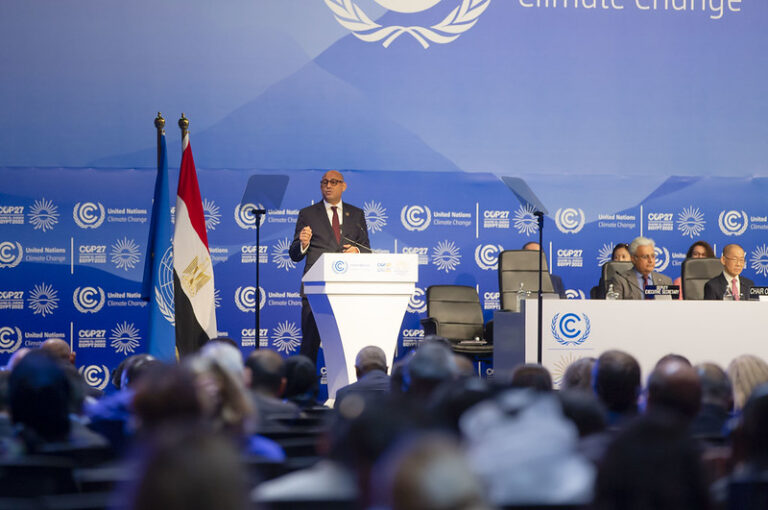Week 1 at Sharm El-Sheikh: World Leaders Come Together For Implementation
The COP27 began on November 6th, with the Egyptian Foreign Minister Sameh Shoukry being elected as President. The conference welcomed over 40,000 attendees, including heads of state, civil society and relevant stakeholders. The theme of this year’s conference was set as “Delivering for people and the planet”, bringing world leaders #TogetherForImplementation of existing climate agreements. The roundtable sessions opened up with discussions on a range of pertinent issues, including Just Transition, Food Security and Innovative Finance for Climate and Development.
On November 8th, the first ever Children and Youth Pavilion in the history of climate conferences opened at COP27, contributing to further visibility, engagement and empowerment of young voices. The pavilion fostered their inclusion in the global climate conversation and policy making- a contemporary event that will be crucial in shaping the future to come. Later, the COP27 Presidency launched the #SharmElSheikh Adaptation Agenda- a comprehensive, shared agenda to rally global action around 30 outcomes needed to address the adaptation gap and achieve a resilient world by 2030. The agenda will accelerate transformative actions by countries, businesses, civil society and relevant bodies to adapt to the acute climate hazards facing vulnerable communities.
In a strong message, the COP27 President urged the youth to push governments to action, declaring “I Depend on Your Voices.” This acknowledged and signified the role of young people in climate action, and highlighted the severeness of the underlying inter-generational aspect involved in climate justice. The future of the young people of the world depends on the decisions taken by the leaders of today. In that regard, it was crucial to not only include, but also empower the youth to become active participants in the larger policy discourse.
On November 9th, the COP27 Presidency and the UN Economic Commission for Africa launched “Reducing the Cost of Green and Sustainable Borrowing” initiative, allowing African countries to invest in building climate resilience. The initiative aims at strengthening the ability of African countries to borrow at an affordable rate, mobilize more green funding, and attract private capital. The Finance Day saw the launch of the “Finance or Climate action: scaling up investment for climate and development” report by an independent high-level expert group mandated by both COP26 and COP27.
The Science Day at COP27 reiterated the importance of data and evidence for delivering implementation. The Presidency remarked that all concerted efforts towards climate action must draw upon science to find solutions. Similarly, the Decarbonization Day on November 11th prioritized hard-to-abate sectors. The Presidency stressed that it’s a “global problem that needs a global solution”, and called for urgent action to reduce emissions. The Adaptation and Agriculture thematic day focused on the fundamental problem of how will the world feed 8 billion. The day saw the launch of four key initiatives that address food security, nutrition, decent life and sustainable peace. Furthermore, the “Climate Responses for Sustaining Peace (CRSP)” initiative was launched to mobilize integrated climate responses that advance sustainable peace and development.


